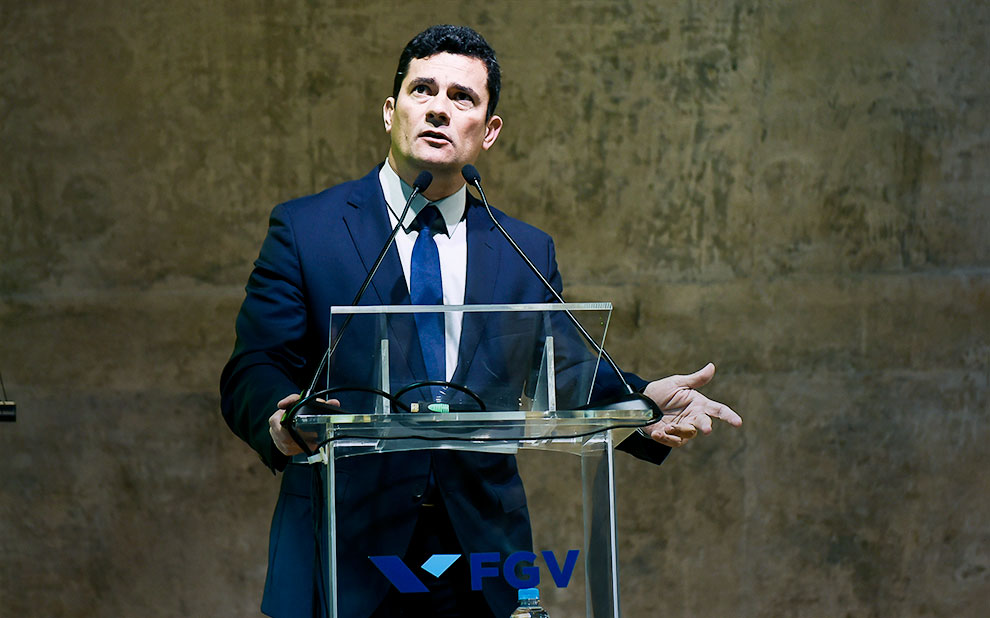Sérgio Moro pushes for iron-handed public policies to fight corruption during FGV symposium
The future minister wants to fight crime by rolling out iron-handed public policies, generating the same massive impact as the Real Plan had on the country’s economy.

The future Minister of Justice, Sérgio Moro, scholars, authorities and civil society representatives gathered on November 23 at FGV’s Cultural Center, in Rio de Janeiro, to discuss the fight against corruption. During the event, held by FGV Energy and the National Association of Federal Chief Police Officers (ADPF), and supported by FGV’s Rio de Janeiro Law School (Direito Rio), the former federal judge ahead of the Car Wash Operation (Lava Jato) confirmed that he will submit a bill against corruption, organized crime and violent crimes immediately after taking office.
According to Moro, the last few years have shown us how corruption is completely out of control. He stated that organized crime has become a national security issue, since these organizations are gaining more and more power completely unscathed by any public countermeasure, except in a few isolated cases. He also underlined how violent crimes perversely affect minorities, such as victims of homicide. The future minister wants to fight crime by rolling out iron-handed public policies, generating the same massive impact as the Real Plan had on the country’s economy.
“We all want a better justice system and public safety in Brazil. We often see some of Brazil’s deeply rooted problems as inherent issues, believing that we can’t do anything about the off-the-charts violence and crime, as well as the lack of accountability. But that is not true. What we need to do is to bolster our institutions and make them more efficient. We must never forget how Brazil managed to tackle the huge problem of hyperinflation in the 1980s and early 1990s. We can overcome this issue through consistent public policies. Starting in January, our goal is to create a kind of Real Plan against crime in Brazil.”
In the same panel, federal judge Marcelo Bretas – who led the Car Wash Operation’s trials in Rio de Janeiro – underlined that the debate on corruption must be top priority, since it directly affects society’s development.
“In an environment where corruption is the norm, the much-needed funds will never be used to help the population, especially those who need it the most”, said Bretas.
Earlier on, just after the opening ceremony led by FGV’s President, professor Carlos Ivan Simonsen Leal, the Federal Police superintendent in the state of Sergipe, appointed by Moro to head the International Legal Cooperation and Asset Recovery Department as of 2019, Érika Mialik Marena, stated that corruption not only affects democracy, when politicians use embezzled money in their campaigns, but also the economy, since it jeopardizes fair market competition, in addition to prompting massive social losses.
The event was also attended by the governor-elect of Rio de Janeiro, Wilson Witzel, and the mayor of Rio de Janeiro, Marcelo Crivella, who participated in the last panel of the event, alongside Maurício Valeixo, future director of the Federal Police Department (PF), and Erick Blatt, federal chief of police and deputy director of the ADPF. The symposium also included Carlos Quintella and Sérgio Guerra, directors of FGV Energy and Direito Rio, respectively, Luis Carlos Cruz, federal chief of police and director of ADPF, Fernando de Pinho Barreira (criminal expert), Fabiano Angélico (Transparency International), Márcio Adriano Anselmo (Federal Police), Jorge Barbosa Pontes (Federal Police), Yuri Sahione (Brazilian Bar Association – OAB/RJ), Michael Mohallem (Direito Rio), Ricardo Andrade Saadi (Federal Police), and Edvandir Felix Paiva (Federal Police).
Watch the full event below
Morning:
Afternoon:
Leia também
